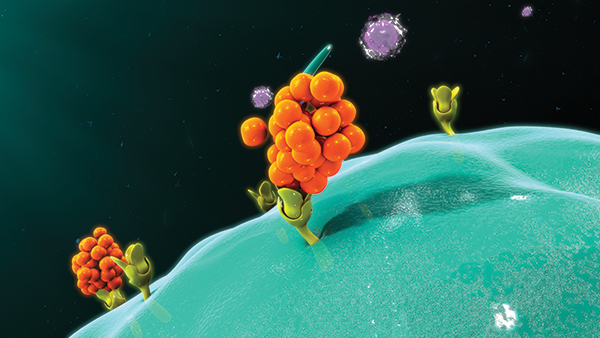INFLAMMATION OCCURS when the immune system responds to infection or injury. It typically lasts only hours or days. But when inflammation is chronic, lasting for weeks, months or years, it can increase the risk of cancer. Studies have found that chronic inflammation increases one’s risk for many types of cancer, including lung, liver and stomach cancers.
Smoking, drinking alcohol and being obese can all cause chronic inflammation. Other causes of inflammation include long-lasting bacterial or viral infections, autoimmune diseases and exposure to asbestos. Although it was first suggested that cancer was linked to inflammation in 1863, it took more than a hundred years for researchers to start exploring the connection.

CIPhotos/istock
Cancer Today spoke with Michael Karin, a molecular biologist at the University of California, San Diego, about why inflammation increases the risk of cancer and how reducing inflammation can help prevent cancer.
Q: What is inflammation?
A: Inflammation is the immune system’s reaction to infection, trauma or foreign items like splinters that invade the body. The normal roles of inflammation are getting rid of foreign organisms and wound healing, which stimulates the regeneration of normal cells.
Q: How does inflammation cause cancer?
A: When inflammation goes on for a long time, it can stimulate the growth of cancer cells. This chronic inflammation also inhibits people’s immunity, suppressing the ability of the immune system to recognize cancer as foreign and reject it.
Q: What causes chronic inflammation?
A: This is something that we don’t understand very well. Sometimes your immune system can’t get rid of bacteria, and this persistent infection can cause chronic inflammation. For example, gastric ulcers are caused by chronic bacterial infection, and gastritis can increase the risk of stomach cancer.
Q: Can people tell if they have chronic inflammation?
A: Sometimes. If you have inflammatory bowel disease, you don’t feel well so you know you have it. But if you have chronic hepatitis and do not have jaundice (yellow skin and eyes), fever or pain, you may not know without a blood test.
Q: Can cancer occur without inflammation?
A: The majority—90 percent or more—of colorectal cancer is not associated with pre-existing inflammation. However, cancer can cause inflammation, and that inflammation can help the cancer grow and metastasize (spread to other parts of the body).
Q: Are there other causes?
A: Lifestyle factors such as smoking, alcohol consumption and obesity can cause inflammation. Tobacco smoke causes inflammation. It also delivers a carcinogen to your lungs. Studies show that stopping smoking, drinking less alcohol, getting more exercise and improving one’s diet reduce inflammation—and the risk of cancer-related death.
Liver cancer in adults is almost always caused by inflammation. Most liver cancer is caused by hepatitis, which can be spread through shared needles or sexual transmission. Drinking too much alcohol can also cause hepatitis. In obese people, fatty liver disease can cause inflammation. Exercise helps burn fat, and exercise and diet can probably reverse early fatty liver disease, but there is very little data so far.
Q: Is there anything else people can do to reduce chronic inflammation?
A: If you can’t identify the cause of inflammation, you could try anti-inflammatory drugs. Aspirin has been shown to reduce cancer risk. But you should consult your doctor before starting to take aspirin daily. You shouldn’t treat yourself.
Q: What is the most important take-home message from your research for the average person?
A: People should not just sit and think that cancer is just a roll of the dice. Not every cancer is just bad luck. Making lifestyle choices that will reduce inflammation can reduce the risk of cancer.
Cancer Today magazine is free to cancer patients, survivors and caregivers who live in the U.S. Subscribe here to receive four issues per year.




